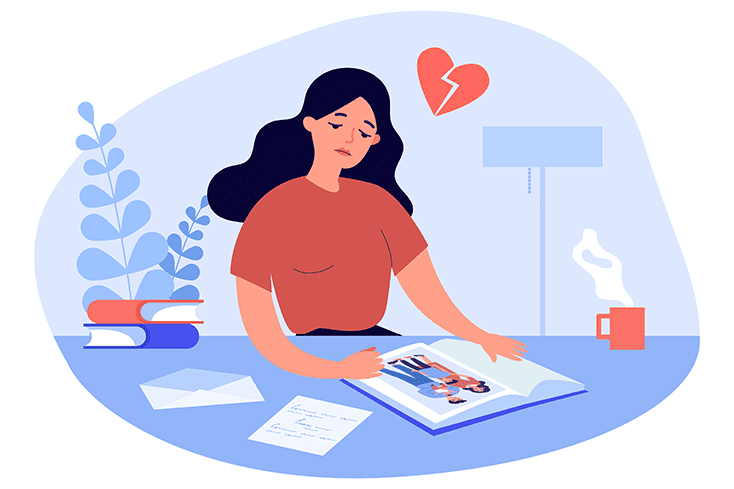
I am a suicide loss survivor. I have lost three family members to suicide — my cousin Craig in 2011 and his son, Aaron, in 2014. I also lost my dad, Dan, in 2012. I have felt all these losses deeply, and more than 10 years later, I still have moments that take me back to those first minutes of hearing about their deaths. I have come to the painful realization that reaching some type of “closure” from these losses is a myth. These tragedies, like other major experiences in my life, will be with me indefinitely.
Losing someone to suicide is different from other types of loss, largely because of the stigma surrounding mental illness. While people won’t hesitate to discuss someone’s brave battle with cancer and include that in an obituary, those who die by suicide are often surrounded by secrecy and vague statements about how they died. The loss might even be labeled as an “accident.”
Those affected by the loss may also feel isolated and alone because people who would typically be supportive during a tragedy don’t know what to do or say when a suicide occurs. The trauma associated with being a suicide loss survivor and its resulting effects can create a tough road to navigate.
Centering Suicide Loss Survivors in the Mental Health Movement
Every year, I see more and more groups and individuals spreading the message about suicide prevention. I applaud these efforts and admire the passion for creating a proactive approach to mental health. I also think it’s important to reflect on where we have been and what led us to this point of openly talking about it.
While it would be hard to measure exact numbers, my suspicion is that most of us who are involved in suicide prevention have been touched by suicide in some way. For every suicide loss, there is an even larger number of people that are impacted by that loss. It makes sense to me that suicide loss survivors would forward a message of prevention so that others would not have to go through what they did.
However, this connection brings to light a reality that I think we should all consider: Suicide is complex — there are no simple answers that explain why people die by suicide. Research is ongoing and progress is being made, but I encourage all of us to be careful about oversimplifying a message that ultimately cannot be simplified.
I write these words as a reminder to myself as well because I have done this in my activism too, particularly when sharing suicide prevention messaging on social media. Other times, I have spoken of suicide in ways that try to avoid making someone uncomfortable and promote a positivity that’s not realistic. Prevention (and the hope that accompanies it) is the goal, but many suicide loss survivors understand that we are not there yet.
The Power of Remembrance
I also want to encourage every suicide loss survivor to take some extra time to remember those we’ve lost and share some joyful stories and memories of their lives. We understand that they shouldn’t be defined solely by how they died, but for the multifaceted people that they were — just as we would happily recall the life of someone who died from a physical illness. In prevention efforts and a growing mental health conversation, there is plenty of room to include remembering, talking about and sharing our love for those we have lost to suicide as well.
Craig, Aaron, my dad and I all were raised in the same town, and we spent a lot of time together. Craig was very active in the community, including in his work as a volunteer firefighter. Aaron was an outgoing young adult that could make anyone laugh. My dad was an avid hunter and considered me and my brother to be his biggest accomplishments. I miss and love them all — and that never changes.
There Is Always Hope and a Way to Move Forward
About a year or so after my dad died, I decided to use my experience to join NAMI and become a teacher for the NAMI Family-to-Family course. After teaching a few classes, I became involved in NAMI Walks as well. I joined the Board of Directors for NAMI Iowa and served as the president for a few years. During that time, I was involved in advocacy efforts at the Iowa State Legislature and contributed to multiple fundraising events. When the NAMI Provider course was offered to third-year medical students at Des Moines University, I jumped at the chance to teach again.
More recently, I completed my first American Foundation for Suicide Prevention (AFSP) Overnight Walk in New York City and attended AFSP’s Long Term Survivors of Suicide Loss Summit in Cleveland. Although my family’s losses are still difficult to process, I have found a way to make meaning from them to raise awareness, educate, advocate and support.
While I will never forget the loss of Craig, Aaron and my dad, I choose to remember them by sharing my story and promoting a message of hope. We haven’t reached the goal of 100% suicide prevention yet, but every day we take a few steps forward to someday make it a reality.
If you or someone you know is in crisis, there are resources you can turn to.
The 988 Suicide and Crisis Lifeline offers free, confidential crisis counseling 24/7/365 just by dialing 988 — and you don’t have to be in crisis to call.
If you don’t want to talk on the phone, you can also text 988.
Visit nami.org for more information and resources.
Dr. Dawn Grittmann is a pharmacist and the Senior Manager of Health Care Initiatives at NAMI. In addition to her interest in suicide prevention, her work focuses on both the NAMI Hearts + Minds and Frontline Wellness Programs. She is an Iowa native who currently resides in Arizona with her husband and son.

